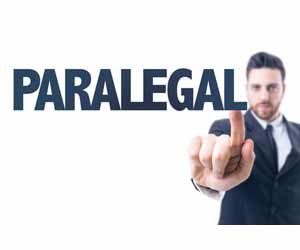Paralegal Employment
Jennifer Utter is an attorney and the former chair of the Legal Studies Department at National American University in Rapid City, SD. In this interview with JobMonkey, she describes her background, the skills most important to the success of paralegals, and how paralegals can be best utilized by attorneys.

Please describe what interested you in the legal profession.
I was looking for a professional career where I could live in a big city or a small town, open my own business if I didn’t want to work for someone else, and help people!
What type of law do you practice? Does your office utilize paralegals?
I am a prosecutor, so I practice criminal law. My office has several paralegals on staff. Paralegals in our office initially start out focusing on legal secretarial work, and then move into trial practice, such as witness preparation, preparing jury instructions, managing the attorney’s caseload by keeping track of deadlines, and working closely with crime victims to seek restitution from criminal offenders.
What prompted you to become a paralegal educator?
I was invited to sit on an Advisory Board for the Paralegal Studies Program at NAU in 1991 and became an Adjunct Instructor through that contact. In addition to my work as a prosecutor, and also as a private attorney, I taught several courses before being asked to serve as the Program Chair of that Department.
What are the major components of a solid paralegal education?
Courses that help develop critical thinking skills, a strong legal research and writing program, ethics, and courses which provide an overview of the basics of both civil and criminal law. A separate study of the history and foundation of our Constitution and legal system is also highly recommended!
Do you think paralegals should have to be licensed? Why or why not?
I don’t think it should be required, however, licensure gives a hiring attorney a solid idea of the skills and experiences a prospective new hire has acquired, and that means a lot to me in today’s environment.
On the other hand, if a long-time assistant has developed skills on the job, and the employing attorney is comfortable with awarding the employee the title of paralegal, with the accompanying duties and responsibilities, then I don’t think there should be a law against that promotion. It’s the licensed attorney who is ultimately responsible for the paralegal’s duties and ethics, so I think it should be up to the attorney.
Is certification important for paralegal advancement?
While no certificate can take the place of an exceptional work ethic and excellent job performance, a person’s certification tells me two things: 1) This is a professional who is meeting or exceeding national standards in their profession, and 2) This is a professional who is seeking continuing education and recognition for their skills. By adding certification, they add value not only to themselves, but to their employer, as well.
Where do paralegals typically find employment?
Private law firms, government agencies, and large businesses with in-house corporate counsel.
What is the single most important characteristic of a successful paralegal?
Flexibility! No two days will be the same, and a paralegal is often asked to assume new duties with little explanation. A person who must be locked into a routine will have some stressful days if they aren’t able to learn to adapt.
What do you see as the challenges of the paralegal profession? The positives?
Challenges: Getting paid according to your skills. Many attorneys also require that you mix secretarial and paralegal duties (our office does), which can be frustrating at first.
Positives: If you are willing to work in an entry-level paralegal job, and prove yourself valuable to your firm as a paralegal, you may be able to negotiate higher pay and more specialized duties.
Overall, paralegals have many of the abilities of an attorney (sometimes more, depending on experience), yet their liability exposure is very little. They can do practically everything in terms of the nuts and bolts of what an attorney can do, as assigned, except give legal advice.
How do you feel paralegals can best be utilized in a law office?
It depends on the office, and the duties. As a criminal trial lawyer, I need a paralegal to help with pre-trial follow-up investigation, trial preparation of witnesses, scheduling, managing and marking trial exhibits, creation of presentations for opening and closing statements, assistance at counsel table during trial, and managing my other office case files while all this preparation and presentation are going on! An attorney with a family law practice may need an intake paralegal, researcher, someone to draft standard documents, and sit down with clients to fill out inventories and forms. Over all categories, a paralegal’s ability to research and write draft documents is probably the most helpful to attorneys.
What are some of the duties that attorneys can delegate to paralegals?
Legal research and writing, client interviews, witness interviews, file organization and interface with other agencies. Nearly everything, except GIVING LEGAL ADVICE.
What is the outlook of the paralegal profession, as you see it?
I believe this profession is a growing one, and has a great potential for expansion into not only traditional jobs with attorneys, but other areas of government and business. Thinking in terms of a paralegal degree, and I see the potential outlook for someone with that degree as unlimited. A person with a paralegal degree has demonstrated that they can think in new and logical ways, interact with people, and dedicate themselves to completing a course of study that will allow them to help others. And who knows? You may decide you like it so much you go to law school! It’s all good!


 Teach English in Asia
Teach English in Asia  Cruise Ship Jobs
Cruise Ship Jobs  Alaska Fishing Industry Jobs
Alaska Fishing Industry Jobs  Sharing Economy / Gig Economy
Sharing Economy / Gig Economy 